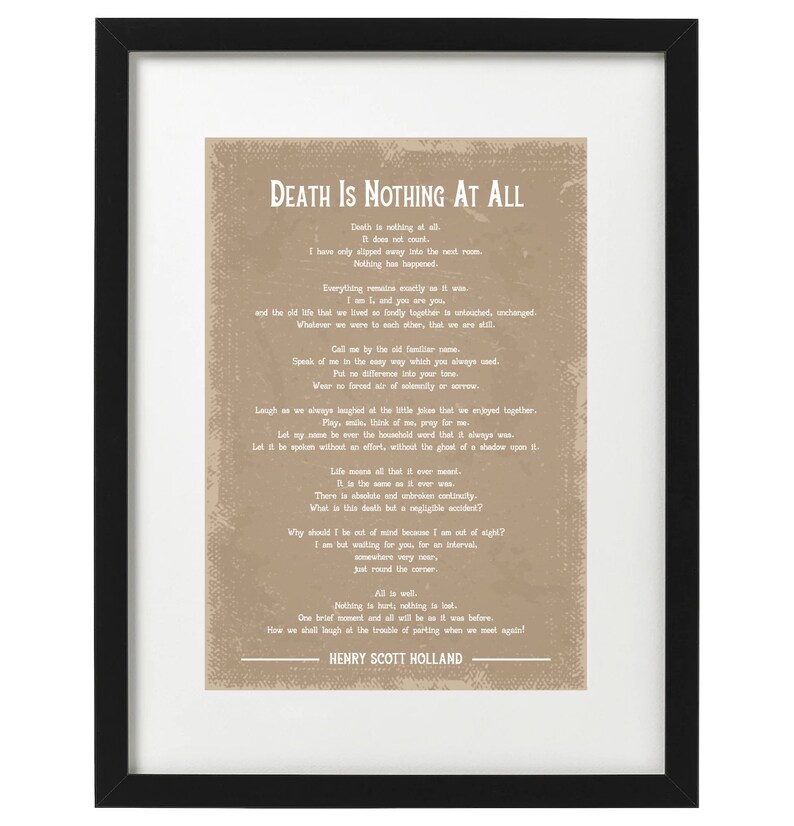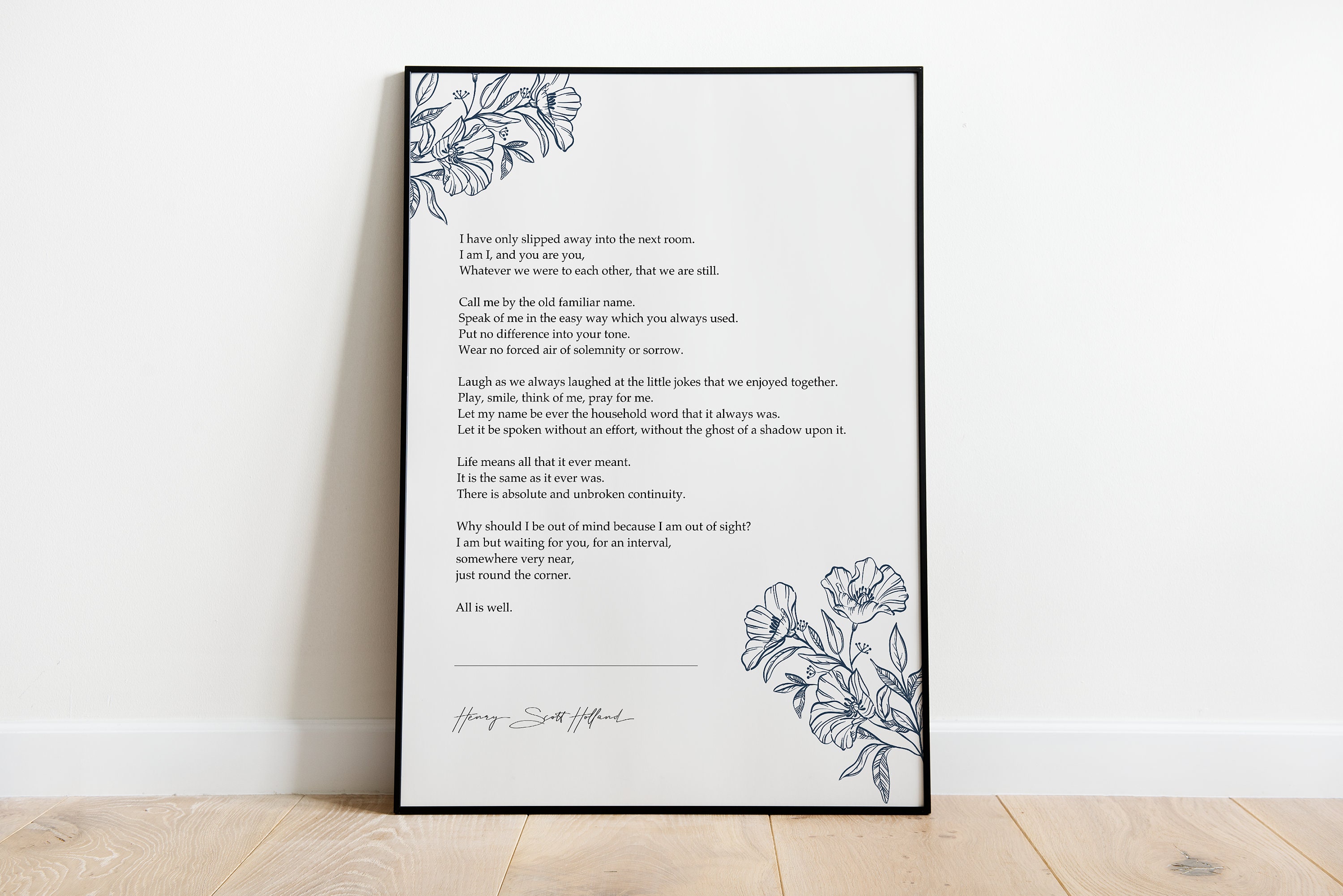As a lifelong student of philosophy and literature, I’ve always been drawn to the comforting words of Henry Scott Holland’s famous essay “Death Is Nothing at All.” The essay eloquently tackles the subject of death, offering a sense of solace and hope in the face of loss. It was during a particularly challenging period in my own life that I first encountered Holland’s words, and they offered a profound sense of peace and reassurance. This essay, written in the early 20th century, continues to resonate with readers across generations, providing a timeless perspective on the inevitability and beauty of death.

Image: www.printabletemplate.us
The enduring popularity of “Death Is Nothing at All” speaks to the universality of the human experience of grief and the search for meaning in the face of mortality. Holland’s words, despite their age, feel remarkably relevant to today’s world. In an era marked by increasing anxiety and uncertainty, his message of hope and resilience offers a powerful antidote to the pervasive fears surrounding death.
Unveiling the Timeless Message of “Death Is Nothing at All”
“Death Is Nothing at All” is more than just an essay; it’s a meditation on the nature of death, a testament to the enduring power of love, and a call to embrace the cycle of life and death with grace and acceptance.
Holland’s main argument is that death is not an end, but rather a transition to a different form of existence. He refutes the idea of annihilation, suggesting that our souls, our essence, continues to live on in the hearts and memories of those who loved us. This concept, presented in a beautifully poetic and lyrical style, offers a profound sense of peace and reassurance, reminding readers that even though the physical form passes away, the essence of who we are continues to exist in the world.
The Essay’s Impact: A Touchstone for Many
Holland’s essay has touched countless people, offering comfort and solace in moments of grief and loss. It has become a source of inspiration for many, inspiring them to embrace life with greater purpose and appreciation. The essay’s popularity is a reminder that even in the face of mortality, human beings have an innate desire to find meaning and hope. It’s a testament to the power of words to offer comfort and guidance, especially during difficult times.
Exploring the Essay’s Enduring Appeal
“Death Is Nothing at All” resonates with readers because it speaks to the profound questions that all humans grapple with: the meaning of life, the nature of our existence, and the inevitable reality of death. Holland’s essay tackles these questions with a combination of theological insight, poetic eloquence, and a deep understanding of the human experience. His message is simple but profound: death is not an end, but a transition; love, though tested by loss, endures; and life itself is a precious gift to be cherished.

Image: ubicaciondepersonas.cdmx.gob.mx
The Essay’s Relevance in Today’s World
In our fast-paced, technologically driven world, where death is often a distant and abstract concept, Holland’s essay serves as a powerful reminder of the fragility of life. It encourages us to live with greater purpose and meaning, appreciating the moments we have and cherishing the connections we make with others. In an age where we are constantly bombarded with images and narratives that emphasize achievement and success, Holland’s voice reminds us that true beauty lies in the simple joys of connection, in living with purpose, and in accepting the inevitable and embracing the cycle of life and death.
Finding Meaning and Hope in the Face of Loss
“Death Is Nothing at All” offers a compelling argument for finding meaning and hope even in the face of loss. The essay draws from religious and philosophical traditions, weaving together themes of love, faith, and the continuity of existence. It reminds us that our loved ones are not truly gone but exist in a different form, a different state of being. This message of hope and continuity can be a powerful source of comfort, offering readers a sense of peace and reassurance during times of grief.
Expert Advice: Embracing the Journey of Life and Death
Here are some insights based on Holland’s essay and my own reflections on life’s journey:
- Embrace the Present. Make the most of every moment, cherishing the people you love and engaging in activities that bring you joy. The present moment is all we truly have.
- Cultivate Meaningful Connections. Foster strong relationships with loved ones, building bonds of love and understanding that will endure through time. These connections provide solace and support during difficult times.
- Live a Life of Purpose. Find meaning in your pursuits, whether through work, hobbies, or acts of service. A life lived with purpose is a life well-lived.
- Accept the Cycle of Life and Death. Death is an inevitable part of life. Don’t resist it but rather embrace the cycle of birth, growth, and decay as a natural part of being human.
These insights are a testament to how Holland’s work continues to offer guidance and inspiration, even in the 21st century. By embracing the present, cultivating meaningful connections, living a life of purpose, and accepting the natural cycle of life, we can navigate the challenges of mortality with grace and resilience.
General FAQ on “Death Is Nothing At All”
Q: Where can I find a copy of “Death Is Nothing at All?”
A: The full text of “Death Is Nothing at All” is widely available online, as well as through various print and electronic resources. Check online libraries, book retailers, and academic databases.
Q: Is “Death Is Nothing at All” a religious essay?
A: While Holland was a clergyman, the essay draws from a broader philosophical and spiritual perspective, offering a message of hope and resilience that can resonate with people of different faiths and beliefs.
Q: How does “Death Is Nothing at All” differ from other essays on death?
A: Holland’s essay stands out for its emphasis on the endurance of love and the continuity of existence beyond physical death. It offers a unique perspective that blends theological insights with a poetic sensibility.
Q: What is the most important message of “Death Is Nothing at All?”
A: The most important message is that death is not an end but a transition. Love endures, and life itself is a precious gift to be cherished. The essay encourages us to embrace the cycle of life and death with grace and acceptance.
Henry Scott Holland Death Is Nothing At All Pdf
Conclusion: A Call to Action
Henry Scott Holland’s “Death Is Nothing at All” encapsulates a timeless message of hope and resilience. As we grapple with the inevitability of death, his words offer solace and guidance, reminding us that love transcends mortality and that life itself is a precious gift to be cherished. If you haven’t already discovered the power of this essay, I encourage you to take the time to read it. It might just change your perspective on life and death forever.
Are you interested in learning more about this powerful essay or the profound questions it raises? Share your thoughts and reflections in the comments below.






